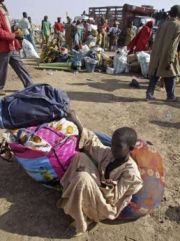Insecurity, funding shortfalls trouble Chad relief effort
By Daniel Van Oudenaren
November 5, 2008 (WASHINGTON) – Not for the first time, aid agencies are warning that worsened insecurity in eastern Chad has cut off effective humanitarian relief to over 26,000 people in Dogdoré, a refugee camp 30 kilometers west of Darfur.
 “Humanitarian operations remain suspended in Dogdoré, with the exception of urgent activities such as responses to medical emergencies and the provision of drinking water,” said Philippe Verstraeten, the Chad coordinator for the UN humanitarian agency OCHA.
“Humanitarian operations remain suspended in Dogdoré, with the exception of urgent activities such as responses to medical emergencies and the provision of drinking water,” said Philippe Verstraeten, the Chad coordinator for the UN humanitarian agency OCHA.
Despite the apparent renewal of a diplomatic process between Chad and Sudan, fighting and banditry still threaten aid to vulnerable populations in a war that has rocked this remote region since an insurgency broke out in Darfur in 2003.
The insecurity hinders an underfunded and already enormously difficult logistical effort in eastern Chad, where there are approximately 250,000 Sudanese refugees and 180,000 internally displaced persons (IDPs).
Armed elements are reported in and around camps and aid sites, compromising the civilian character of these locations, said OCHA on Wednesday.
“The security situation of the east is still unpredictable and marked by the resurgence of criminality and burgling in houses. Many robberies and car hijackings have been reported,” the World Health Organization noted in early October as it struggled with Hepatitis E outbreaks in Dogdoré and Bredjing IDP camps.
But the scope of the conflict is far wider than banditry and burgling—reports of troop movements in the last two weeks indicate that the Justice and Equality Movement (JEM) and the Chadian army are stirring as the dry season begins, and Sudanese-backed rebels and militias have launched attacks on Chad in each of the last three dry seasons, including assaults on the Chadian capital in 2006 and 2008.
What has changed since then is the stronger presence of peacekeepers in eastern Chad, where a European Union force (EUFOR) reached full operating capacity on Sept. 15.
But the roughly 3,400 EU troops do not operate in many areas, including Dogdoré. Humanitarian organizations are now advocating for more security around Dogdoré, asking help from both Chad and MINURCAT, the UN mission under which EUFOR holds its mandate.
“I trust that the Chadian Government will step up its efforts to improve security conditions in those areas, in the interest of the protection of civilians, so that full-scale humanitarian operations may soon resume,” said John Holmes, the UN emergency relief coordinator.
FUNDING SHORTFALLS
Even without attacks on humanitarian vehicles, providing for the hundreds of thousands of people affected by the conflict would still be an expensive and daunting undertaking.
World Food Programme (WFP) supports over 700,000 people in Chad, but its transport needs are more than the commercial sector can handle. The organization has pointed to a lack of commercial trucks with the right capacity to reach remote camps, the potential for congestion at Douala port in Cameroon and the unwillingness of the commercial sector to operate beyond Abéché to the camps in eastern Chad.
“Since the local transport market is not adjusting to the demand of the humanitarian agencies in terms of capacity and price, the only viable option to secure timely and cost-effective humanitarian deliveries is to strengthen the current transport capacity by bringing in a (truck) fleet dedicated to the humanitarian community. Such a fleet will immediately improve the entire humanitarian community’s transport capacity,” notes a WFP project abstract.
Planners requested a budget of $5.27 million for a logistics cluster and 30 new trucks with 20 mt trailers—but no one has provided funding, a fact confirmed by an official on Tuesday.
“The short-term pipeline situation is good,” acknowledged a September report on WFP’s operational priorities. But the report warned, “significant (budget) shortfalls are foreseen in March 2009 that, if not resolved, could impact the ability of WFP to preposition food in time for the 2009 rainy season.”
WFP also revised its funding appeal mid-year for aerial humanitarian aid from $2.8m to $6.8 million, a step not generally taken except in cases of extremely poor infrastructure or insecurity.
While humanitarian agencies in Chad received 73% of the funding that they requested for 2008, there are major shortfalls for water, sanitation, agriculture, health and protection projects. Other less urgent sectors, like education for children touched by the war, have been all but ignored; the sector is only 14% funded.
Thus far donors have contributed $268 million to the relief efforts in Chad in 2008.
(ST)
